Related Research Articles

The Bible is a collection of religious texts or scriptures, some, all, or a variant of which are held to be sacred in Christianity, Judaism, Samaritanism, Islam, the Baha'i Faith, and many other Abrahamic religions. The Bible is an anthology, a compilation of texts of a variety of forms, originally written in Hebrew, Aramaic, and Koine Greek. These texts include instructions, stories, poetry, and prophecies, among other genres. The collection of materials that are accepted as part of the Bible by a particular religious tradition or community is called a biblical canon. Believers in the Bible generally consider it to be a product of divine inspiration, but the way they understand what that means and interpret the text varies.
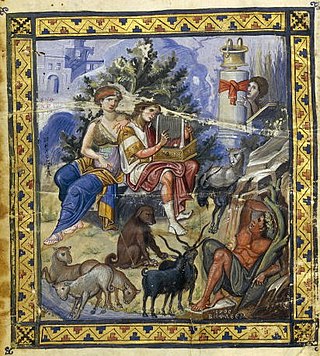
The Book of Psalms, also known as the Psalms, or the Psalter, is the first book of the third section of the Hebrew Bible called Ketuvim ("Writings"), and a book of the Old Testament.

Baal, or Baʻal, was a title and honorific meaning 'owner' or 'lord' in the Northwest Semitic languages spoken in the Levant during antiquity. From its use among people, it came to be applied to gods. Scholars previously associated the theonym with solar cults and with a variety of unrelated patron deities, but inscriptions have shown that the name Ba'al was particularly associated with the storm and fertility god Hadad and his local manifestations.
Ugaritic is an extinct Northwest Semitic language, classified by some as a dialect of the Amorite language. It is known through the Ugaritic texts discovered by French archaeologists in 1928 at Ugarit, including several major literary texts, notably the Baal cycle. It has been used by scholars of the Hebrew Bible to clarify Biblical Hebrew texts and has revealed ways in which the cultures of ancient Israel and Judah found parallels in the neighboring cultures.

Elohim, the plural of אֱלוֹהַּ, is a Hebrew word meaning "gods" or "godhood". Although the word is grammatically plural, in the Hebrew Bible it most often takes singular verbal or pronominal agreement and refers to a single deity, particularly the God of Israel. In other verses it refers to the singular gods of other nations or to deities in the plural.

The New American Bible (NAB) is an English translation of the Bible first published in 1970. The 1986 Revised NAB is the basis of the revised Lectionary, and it is the only translation approved for use at Mass in the Latin Church Catholic dioceses of the United States and the Philippines, and the 1970 first edition is also an approved Bible translation by the Episcopal Church in the United States.
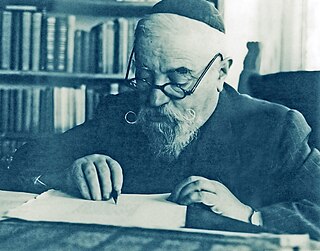
Umberto Cassuto, also known as Moshe David Cassuto, was an Italian historian, a rabbi, and a scholar of the Hebrew Bible and Ugaritic literature, in the University of Florence, then at the University of Rome La Sapienza. When the 1938 anti-Semitic Italian racial laws forced him from this position, he moved to the Hebrew University of Jerusalem.
Robert Bernard Alter is an American professor of Hebrew and comparative literature at the University of California, Berkeley, where he has taught since 1967. He published his translation of the Hebrew Bible in 2018.
Cyrus Herzl Gordon was an American scholar of Near Eastern cultures and ancient languages.
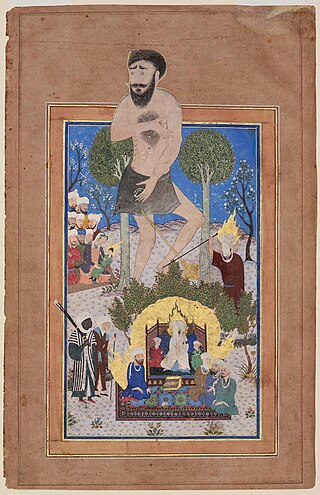
In the Hebrew Bible, as well as non-Jewish ancient texts from the region, the Northwest Semitic term Rephaite or Repha'im refers either to a people of greater-than-average height and stature in Deuteronomy 2:10-11, or departed spirits in the afterlife, Sheol as written in the following scriptures: Isaiah 26:14; Psalms 88:10, and Proverbs 9:18, as well as Isaiah 14:9.
Mark Stratton John Matthew Smith is an American Old Testament scholar and professor.
Jon Douglas Levenson is an American Hebrew Bible scholar who is the Albert A. List Professor of Jewish Studies at the Harvard Divinity School.
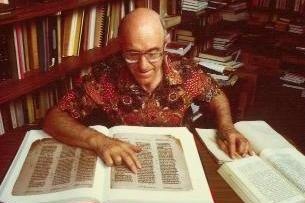
Francis Ian Andersen was an Australian scholar in the fields of biblical studies and Hebrew. Together with A. Dean Forbes, he pioneered the use of computers for the analysis of biblical Hebrew syntax. He taught Old Testament, History, and Religious Studies at various institutions in Australia and the United States, including Macquarie University, the University of Queensland, and Fuller Theological Seminary. His published works include the Tyndale commentary on Job, and Anchor Bible commentaries on Hosea, Amos, Habakkuk and Micah, and over 90 papers.

Psalm 45 is the 45th psalm of the Book of Psalms, beginning in English in the King James Version: "My heart is inditing a good matter". In the slightly different numbering system used in the Greek Septuagint and Latin Vulgate translations of the Bible, this psalm is Psalm 44. In Latin, it is known as "Eructavit cor meum". It was composed by the sons of Korach on the shoshanim–either a musical instrument or the tune to which the psalm should be sung. The psalm has been interpreted as an epithalamium, or wedding song, written to a king on the day of his marriage to a foreign woman, and is one of the royal psalms.
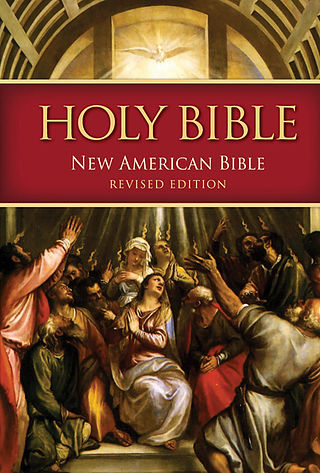
The New American Bible Revised Edition (NABRE) is an English-language Catholic translation of the Bible, the first major update in 20 years to the New American Bible (NAB), which was translated by members of the Catholic Biblical Association and originally published in 1970. Released on March 9, 2011, the NABRE consists of the 1986 revision of the NAB New Testament with a fully revised Old Testament approved by the United States Conference of Catholic Bishops in 2010.
Chol, in most passages of the Hebrew Bible, is a word for sand.
Peter Campbell Craigie was a British biblical scholar.
F. W. "Chip" Dobbs-Allsopp is a biblical scholar, epigrapher, and literary theorist. Currently professor of Old Testament, or Hebrew Bible, at Princeton Theological Seminary, he has taught and written extensively on Semitic languages, the origins of alphabetic writing, biblical poetry, poetics, and literary criticism.
Peter W. Flint was involved in research of the Dead Sea Scrolls for over 20 years. He was one of the 70 official members of the Dead Sea Scrolls editors worldwide. As the controversy of publishing of the Dead Sea Scrolls escalated, in 1987 he moved from South Africa to the University of Notre Dame in Indiana where he took a doctoral fellowship and began to study under Eugene Ulrich, the chief editor of the biblical Dead Sea Scrolls and one of the central figures of the controversy. In 1997, Flint finished publishing the Psalms Scrolls: the second largest portion of the biblical Dead Sea Scrolls. This publication is full of discoveries providing insights for Bible translations, Bible study and biblical scholarship. Flint was an editor of the largest intact scroll: The Great Isaiah Scroll. He served at Trinity Western University as a professor of Religious Studies, the Canada Research Chair in Dead Sea Scrolls Studies, and a director of the Dead Sea Scrolls Institute. He died on November 3, 2016.
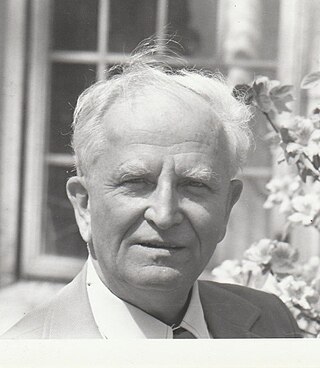
Samuel Lucien Terrien was a French-American Protestant theologian and biblical scholar. A professor at Union Theological Seminary for thirty-six years, he is known for his biblical commentary, particularly for his scholarly contributions to the study of Job and the Psalms in the Old Testament and for his book, The Elusive Presence (1978), in which he presented a new theology of the presence and absence of God written largely in the context of cult, not covenant. It incorporated both Old and New Testaments in a broader ecumenical context and introduced a way for future theologians to ask how the presence of God is experienced by engaging the wisdom traditions to explore how ‘empirical observation can testify to a divine presence in human life just as visionary experiences can.'
References
- 1 2 "The Rev. Mitchell Dahood, 60, A Scholar of Semitic Studies". New York Times. 11 March 1982. Archived from the original on 3 June 2016. Retrieved 11 February 2017.
- ↑ Shanks, Hershel (1982). "Mitchell Dahood-In Memoriam". Biblical Archaeology Review. 8 (3) 6. Archived from the original on 8 August 2016. Retrieved 7 May 2016.
- ↑ Freedman, David Noel (1982). "Mitchell Dahood 1922-1982, in Memoriam". The Biblical Archaeologist. 45 (3): 185–187. doi:10.1086/BIBLARCH3209813. JSTOR 3209813. S2CID 189439008.
- ↑ Moore, Michael S. (1981). "A Short Note on Mitchell Dahood's Exegetical Methodology". Hebrew Studies. 22: 35–38. JSTOR 27908697.